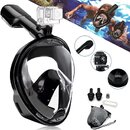jadairiii
Contributor
- Messages
- 1,372
- Reaction score
- 2,095
You wont see this in the paper. I went out Monday morning, early, for a 2 mile ocean swim. the ocean was flat calm. At the very end of my swim I came across a woman in distress, on the verge of downing, with a mask on. A full face snorkel mask (the one pictured from Walmart, she told me she bought it there). These masks have been involved in other drownings. They can fill with water, are hard to remove, possibly have CO2 retention issues, and can create a panic situation in untrained swimmers.
My rescue was just that, young woman had drifted quite a way from shore, beyond the vessel exclusion buoys, about 150 yards from shore (give or take) she was wearing the mask/snorkel, full suit rash guard and a life vest like one would see on skiers or small boats (not a dive vest), no fins. She was exhibiting the "standard" exhaustion/drowning attributes, oddly calm and quiet. I approached her, told her she shouldnt be outside the buoys and knew instantly she was in distress. I tried to get her to take the mask off but I could tell that was causing more stress, worse, that mask was not easy to get off quickly. So I told her I would swim her in, and continued to talk with her to make sure that she could breath, during that period she relayed to me that she did get water in the mask and had issues getting it clear, but I could tell it was clear and I continued to speak with her to verify no water was in the mask. She was borderline incoherent when I first got to her, but as we got closer to shore, and she was not expanding any energy swimming, she was more coherent. I got her to the beach, got the mask off, she couldnt stand up, as I was assessing my next option, an off duty life guard came swimming up (who was also just doing a morning swim). He then took over, he went to the nearest tower while I helped her to the get there, she could not walk on her own. He got her on oxygen and had a bystander call 911. All's well that ends well. This 26 year old woman was very lucky this weekend.
Since was was just doing a ocean swim I had no cutting device, had I, I would have immediately cut the straps. But as stated, as I attempted to get the mask off I could see it was causing more distress than just leaving it be.
And I relay this story to warn others, its not about me, I've had lifeguard training, first aid training, its not my first water rescue, and it was nothing to swim her in. I'm just glad I was there.
If you have one of these masks throw it in the trash. If you are at a resort, DO NOT USE IT. Be safe out there.
My rescue was just that, young woman had drifted quite a way from shore, beyond the vessel exclusion buoys, about 150 yards from shore (give or take) she was wearing the mask/snorkel, full suit rash guard and a life vest like one would see on skiers or small boats (not a dive vest), no fins. She was exhibiting the "standard" exhaustion/drowning attributes, oddly calm and quiet. I approached her, told her she shouldnt be outside the buoys and knew instantly she was in distress. I tried to get her to take the mask off but I could tell that was causing more stress, worse, that mask was not easy to get off quickly. So I told her I would swim her in, and continued to talk with her to make sure that she could breath, during that period she relayed to me that she did get water in the mask and had issues getting it clear, but I could tell it was clear and I continued to speak with her to verify no water was in the mask. She was borderline incoherent when I first got to her, but as we got closer to shore, and she was not expanding any energy swimming, she was more coherent. I got her to the beach, got the mask off, she couldnt stand up, as I was assessing my next option, an off duty life guard came swimming up (who was also just doing a morning swim). He then took over, he went to the nearest tower while I helped her to the get there, she could not walk on her own. He got her on oxygen and had a bystander call 911. All's well that ends well. This 26 year old woman was very lucky this weekend.
Since was was just doing a ocean swim I had no cutting device, had I, I would have immediately cut the straps. But as stated, as I attempted to get the mask off I could see it was causing more distress than just leaving it be.
And I relay this story to warn others, its not about me, I've had lifeguard training, first aid training, its not my first water rescue, and it was nothing to swim her in. I'm just glad I was there.
If you have one of these masks throw it in the trash. If you are at a resort, DO NOT USE IT. Be safe out there.




